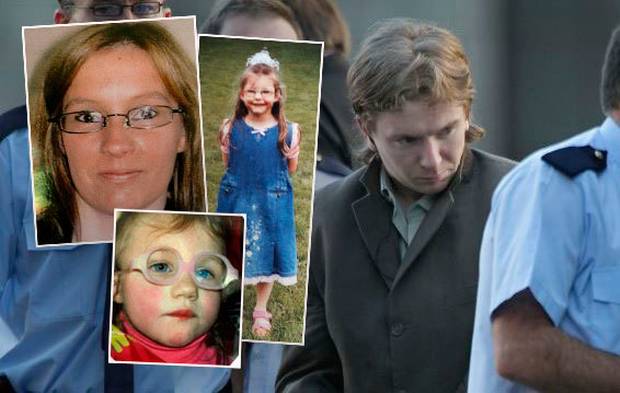EXCLUSIVE: Over 100 families of murder victims join Kilkenny man’s crusade for justice

By COLIN BARTLEY
MORE than a hundred families have joined a Kilkenny man’s crusade to reform the laws surrounding parole and day release of murderers.
John Whelan, from Windgap, is Chairperson and co-founder of the Sentencing And Victim Equality (SAVE), a group for families whose loved ones have been victims of homicides. John’s sister Sharon (30) and her two young daughters, Zarah and Nadia (pictured above, beside image of their killer outside court), were murdered in their home Windgap on Christmas Day in 2008.
Among this group are the family of Kilkenny woman Christine Quinn who died following a prolonged and savage knife attack in her own home in December 2002. Jason and Ronan spoke out this weekend after their mother’s killer, who has never admitted his guilt, was allowed out on day release.
SAVE took their campaign to Daíl this week, to highlight what they see as the legal inequalities that exist between the families of the victims and the perpetrator of the crime, once a sentence has been handed down.
In the days since the Dáil protest, John said the group has been flooded with request by families around the country, who have seen a loved one murdered and who now want to get involved in their campaign.
John told KilkennyNow.ie: “We’ve had more than 100 people request to join our group since then, that’s 100 more families that have lost a loved one in a violent way, they now want to assist and move this campaign.”
John said the public has become much more aware of the plight of victims’ families with regard to the laws surrounding parole and day release.
“There has been a very strong reaction from the general public since the protest on Wednesday and the media coverage that came with it. This is the success of the protest,” John added.
“It became obvious to us on the day how little the public knew about the parole and day release regulations here. When they did hear, they were horrified.”
The protest was something the SAVE felt they had to do. In recent weeks there has been a number of high-profile violent prisoners recommended for temporary release.
John told KilkennyNow.ie: “That was the catalyst to do it. Enough was enough!
“The laws around days release in Ireland are such that the victims have to contact the Department (Of Justice) to find out what the perpetrator is doing. Not the other way around.
“If you are not in constant contact with the prison services, you could bump into these killers on the streets one day, knowing nothing about it.
“Remember there is a hugely high percentage of homicides where the victim and murderer are known to each other. The chances are the murderer is from the same area and will go back to area where the victim and their families are from,” John added.
Under current laws, those convicted of murder who are serving life sentences are entitled to apply for parole after serving just seven years. SAVE wants this changed and soon.
SAVE are looking to have the following areas addressed to help the families of homicide victims:
*To allow Judge’s discretion come in for minimum sentencing from 20 year, to whole life sentences;
*And end to the practice of concurrent sentences;
*No granting of parole until a sentence is served;
*An end to day release;
*The creation of a state-sponsored support unit for victims families.
John said SAVE will continue to highlight the cause of families affected by holm
“The State takes on these cases in the courts. It’s the State V the perpetrator. Surely then after the case is finished the State should take on the responsibility of representing the family in the aftermath,” he added
At Wednesday’s protest, and despite marching to the Department of Justice and Equality’s Office to hand in a petition on behalf of the families of the victims, SAVE did not get to meet with Justice Minister Charlie Flanagan. Instead the Department of Justice released a statement, which said: “The Minister is very conscious of the grief and pain suffered by families of victims of murder. He takes great care in carefully considering the recommendations of the Parole Board in each such case.”




